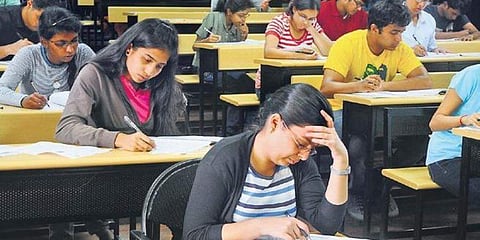

The central government might be mulling over the idea of conducting a common entrance test for non-technical universities across the country, but the teachers do not think it is a good idea. The National Testing Agency conducting entrance exams for universities like the Jawaharlal Nehru University (JNU) has already been heavily criticised for its MCQ format.
While the National Education Policy (NEP) talks about putting an end to the culture of coaching classes, teachers said that a common entrance test will only push students more towards coaching centres. "The engineering and medical aspirants were already burdened with coaching classes and now if non-technical education too has an entrance test, there will be coaching classes popping up for that as well," said Dr Abha Dev Habib, who teaches Physics at Miranda House and is also the Treasurer for the Delhi University Teachers' Association. "Entrance exams lead to an erosion of conceptual understanding of subjects. Students work towards the next step without really concentrating on the classes they are attending in school," she added.
An entrance exam does not only mean coaching classes coming up it also means that students will now have to put all their efforts into one exam. While it gets you out of sitting for multiple tests, it also puts your future in the hands of one exam and how you perform that day. "The coaching classes with thrive on this uncertainty and even aspiring for college education will become expensive," added Dr Habib.
A common entrance exam will only encourage MCQ exams which is not suitable for higher education, said Dr Moushumi Basu, Secretary, JNU Teachers' Association (JNUTA). "This will be a repeat of the MCQ format which is neither suitable nor tenable for higher education. But that's not all, there are specificities of courses taught in particular universities which are unique. How would you harmonise them and bring them under one umbrella?" asked Basu.
The students too are not very fond of the system proposed by the NEP and the government. "This will make it a more unequal setup where students from marginalised sections would find it difficult even to sit for an exam," said Falguni Pan, a postgraduate student at Visva Bharati University. "We should remember that university autonomy would be highly compromised here. Through this centralised system, an uniform fees structure, reservation policy etc might get introduced too, which would not leave any space for students from marginalised backgrounds to aspire for higher education on a subsidised fee structure," said Teerna Bhattacharya, a student of Jadavpur University and the chairperson of the Arts Faculty Students' Union (AFSU).
For some, it's not just black and white — the common entrance exam poses a contradictory situation. "On one hand it will help students who have to now apply to 20 different colleges. The cost gets cut down majorly. But at the same time, the autonomy of the institutes being diminished is a serious issue. It is affordability versus academic integrity," said Atendriya Dana, pursuing hi postgraduation in International Relations from Jadavpur University.
